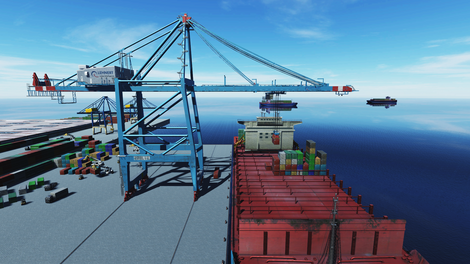Crane automation: general test in virtual world

Digitalisation and the use of artificial intelligence are also changing workflows and processes in freight transport and logistics. With its simulation tool “Polarith AI”, a Magdeburg-based start-up is offering practical solutions for industrial partners – which is already benefiting a company that has dedicated itself to the automation of crane control systems.
Thinking within limits does not suit Martin Kirst. Like the other two managing directors of Polarith, Franz Pieper and Chris Taggeselle, he always focuses his thinking on what is possible. And quite a lot is possible in the field of “artificial intelligence” (AI). The three are taking the route into the world of simulations via stops that provide them with real experiences. In their studies at the Otto von Guericke University in Saxony-Anhalt’s state capital, they received the engineering and business management munition. They are software developers and all three have roots in the games sector. In his course of study, Martin Kirst focused on image generation and processing, later working as a software engineer at the Fraunhofer Institute for Factory Operation and Automation. In the process, the idea emerged that led to the formation of his own company in 2016. It “clicked” in a research project. “Why should developers concentrate on design processes and waste time on programming?”, wonders Martin Kirst, who concludes: “There is a simpler solution.”
Digital modular system for programming AI
The thought was the starting signal for the work on the simulation tool “Polarith AI” – a digital modular system that largely automates the process of programming simulated artificial intelligence. Three years later, five colleagues work at the Magdeburg company for customers in many industries – tendency increasing. Many trade fair visits, networking at events, presentations about AI and the product itself have convinced. Transferring complex knowledge from AI into practice in a targeted manner, optimising processes and applying scientific research results in their work has been well received.
Of interest for everything that is automated
“With artificial intelligence, virtual simulations are simple to create,” explains Martin Kirst. Depending on the target group, various parameters can be fed into the tool. Everything is kept simple and thus quickly usable. “Users thus save time and costs,” says the expert. For developers who simulate environments, creating their special requirements is facilitated. They can design and do not need to program much. The Polarith managing director repeatedly likes to explain his own tool with a modular system from this world. “It is like in Lego – you take only the parts you really need and put them together. For this, you do not need a great deal of knowledge of AI.” This, he says, is of interest for everyone who has to do with moving images and “for everything that is automated”. One piece of evidence: in future, the Magdeburg company wants to become active in the medical sector – simulating the everyday operation work for Magdeburg surgeons in order to improve workflows.
Cranes are first commissioned virtually for the test
The fact that the logistics industry can also benefit from this is shown by the collaboration with Lehnert Regelungstechnik GmbH, which successfully develops and offers automation solutions and anti-sway systems for cranes internationally. To start with, Polarith builds virtual test environments so that products can be tested in a simulated environment – before being built. The “virtual commissioning” is preceded by exact inputs of physical laws and practical bases. “We tried out the automation systems on the virtual crane,” explains Martin Kirst. It went to so well that, a short time later, the Polarith team is also co-developing and advancing the hardware and software. The important step towards further automation of crane control systems has made its mark at Polarith. Martin Kirst is now also the head of technology at the logistics company, performing a balancing act between the two companies. “Of course, that does not work with every order,” he says with a laugh. However, he would welcome the opportunity to “mix it” here near the logistics pond in the longer term.
AI methods as a super sandbox for trying out
Further partnerships with industrial partners are already tangibly close. However, in future, the Magdeburg company also wants to focus on other applications with “Polarith AI” and distribute the software. Sounding out other possibilities is on the company’s own agenda. “We are never finished with our work,” says Kirst. “Something new repeatedly comes in.” The objective, he says, is to make all the programming processes significantly simpler for the user. The entrepreneur says: “AI methods are like a super sandbox for playing ‘What if?’.”
What if we also involved climate protection and optimised process chains in order to protect resources? And what if logistics were influenced by AI to such an extent that the company functioned differently? “There is still much scope for upward movement,” says Martin Kirst. With his company and his Magdeburg base in the real world, there is a lot more he would like to sound out, try out and apply.
Author: Manuela Bock
